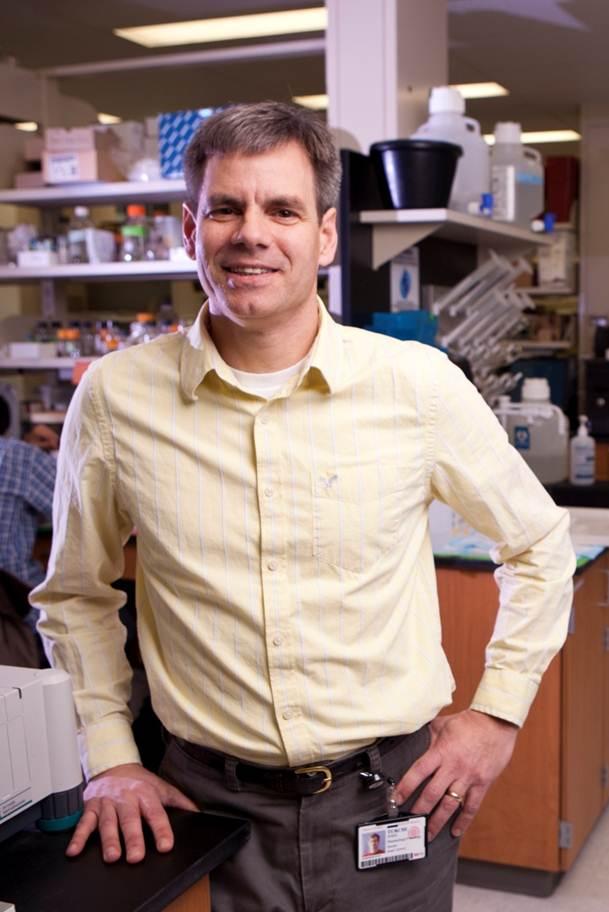
Credit: IU School of Medicine
INDIANAPOLIS — An Indiana University Melvin and Bren Simon Comprehensive Cancer Center researcher has been awarded a five-year, $2.9 million grant from the National Cancer Institute to develop a drug that could make radiation therapy far more effective.
John Turchi, PhD, is studying the DNA-dependent protein kinase (DNA-PK), which is involved in repairing DNA double-strand breaks. When a cancer patient undergoes radiation therapy, the radiation intentionally causes these DNA breaks to kill the cancer cells.
“In the case of radiation therapy, the repair of those breaks is a bad thing,” Turchi said. “It allows the cancer cells to continue to divide. Being able to block that repair pathway through inhibitors of the DNA-PK protein allows us to increase the efficacy of radiation therapy.”
The research focuses on solid tumors that receive radiation therapy as part of treatment, with lung cancer as the main effort. The therapeutic would be given along with radiation.
“In addition to lung cancer, esophageal and head and neck cancers could also benefit. Radiation therapy is a mainstay for these cancers and, we think we can increase the therapeutic benefit of radiation with our drug,” said Turchi, the Tom and Julie Wood Family Foundation Professor of Lung Cancer Research at Indiana University School of Medicine.
Beyond occurring due to radiation therapy, DNA double-strand breaks also can happen in cancer cells as they continuously divide and grow. The therapeutic could be used for certain cancers that don’t receive radiation therapy by targeting these broken cells.
“The grant focuses on understanding how cells respond to stress–specifically DNA damage stress–and exploiting the differences between how cancer cells respond and how normal cells respond for therapeutic benefits,” Turchi explained. “Essentially, we are pursuing a line of research to develop drugs that exploit the differences in how cells respond to DNA damage stress.”
This research could expand the DNA-PK inhibitor options for cancer patients. While there are investigational drugs in the clinic, Turchi’s therapeutic uses a different mechanism of action and could expand options for patients who don’t respond to the existing drugs or whose cancer has become resistant to therapy.
“Our molecule does something completely different,” Turchi said. “There are reasons to believe that our inhibitor allows a greater scope of possibilities for cancers than what is currently being tested in the clinic. Because of this different mechanism of action, it opens up a whole array of things that aren’t possible with the existing therapeutics.”
Turchi and colleagues also are exploring how their molecule could target ovarian cancer with certain genetic predispositions, such as the BRCA mutation. In these cases, the cancer is more susceptible to the drug and could be effective without radiation.
This project’s co-principal investigator is Navnath Gavande, PhD, a former post-doctoral researcher in Turchi’s lab who originally synthesized the new drug compounds. Gavande joined Wayne State University in 2019 as an assistant professor of pharmaceutical sciences and continues to work closely with Turchi to optimize the drug for clinical use. The project also involves collaborators Karen Pollok, PhD, and Joe Dynlacht, PhD, who bring expertise in animal models and radiation oncology. These collaborations are critical to help the researchers better understand DNA damage stress and how to use this knowledge to develop novel anticancer therapeutics.
###
IU School of Medicine is the largest medical school in the U.S. and is annually ranked among the top medical schools in the nation by U.S. News & World Report. The school offers high-quality medical education, access to leading medical research and rich campus life in nine Indiana cities, including rural and urban locations consistently recognized for livability.
Media Contact
Michael Schug
[email protected]
Original Source
https:/




